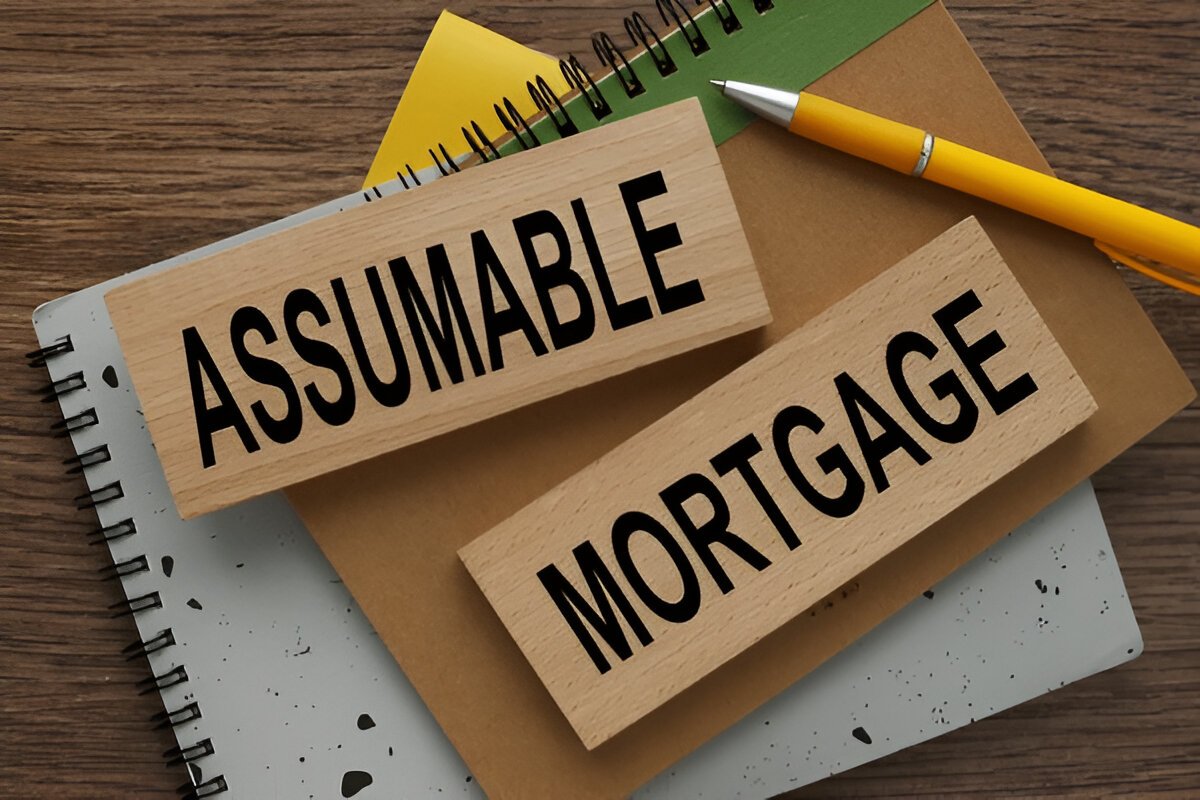In an era where home affordability is becoming more challenging and interest rates continue to fluctuate, many prospective buyers are exploring alternative financing solutions that go beyond traditional mortgages. One such alternative that is gaining traction—especially among savvy homebuyers and investors—is the assumable mortgage.
If you’ve recently searched for “assumable mortgages near me”, you’re already on the path to discovering one of the lesser-known yet potentially powerful ways to secure a home. Assumable mortgages offer unique advantages in certain market conditions, especially when interest rates are on the rise. This article explores what assumable mortgages are, how they work, and whether they’re the right choice for you.
What Is an Assumable Mortgage?

An assumable mortgage is a home loan that allows a new buyer to take over, or “assume,” the existing mortgage of the seller. This means that the buyer continues to make payments on the same loan, under the same interest rate, repayment schedule, and terms that were originally agreed upon by the seller. Unlike a traditional mortgage where the buyer secures a brand-new loan – often at a higher interest rate – an assumable mortgage allows the buyer to step into the seller’s shoes and inherit a potentially more favorable deal.
This setup can be extremely beneficial in high-interest-rate environments. For instance, if a seller has a mortgage with a 2.75% interest rate and current market rates are at 5.5%, assuming the seller’s mortgage can help the buyer save thousands over the life of the loan.
How Assumable Mortgages Work
The process of assuming a mortgage is not as complex as one might expect, but it still involves several important steps. First, it’s essential to determine whether the seller’s mortgage is assumable. Not all loans are structured this way, so reviewing the loan documents or consulting with a real estate agent or mortgage broker is critical. If the loan is indeed assumable, the buyer must then apply for approval from the lender. This typically includes a credit and financial assessment similar to what one might undergo when applying for a new loan.
One of the more important considerations in this process is the equity that the seller has built in the home. Since the buyer is taking over only the existing mortgage balance, they must cover the difference between the sale price of the home and the outstanding loan amount—either with cash or by arranging secondary financing. For example, if the home is being sold for AED 1,000,000 and the remaining mortgage is AED 700,000, the buyer must come up with AED 300,000 to complete the purchase.
Once the lender grants approval and all parties agree on the terms, the final paperwork is signed, and the buyer officially assumes the mortgage. From that point onward, the buyer makes monthly payments under the same terms originally agreed upon by the seller.
Types of Mortgages That Can Be Assumed
Not every mortgage can be assumed, and the ability to do so often depends on the loan type. Government-backed loans such as FHA (Federal Housing Administration) and VA (Veterans Affairs) mortgages are typically assumable, provided the buyer meets the lender’s financial requirements. USDA (U.S. Department of Agriculture) loans can also be assumable, though they tend to come with stricter guidelines.
Conventional loans, which are not insured by the government, are generally not assumable due to “due-on-sale” clauses that require full loan repayment when the property changes hands. However, there may be rare exceptions, particularly with lender-specific policies or portfolio loans that do not include a due-on-sale clause. For this reason, it’s important to review the original mortgage terms carefully before assuming that a loan is eligible.
Key Benefits of Assumable Mortgages
One of the most compelling reasons to consider an assumable mortgage is the potential for a lower interest rate. In a climate where mortgage rates are steadily increasing, taking over a loan that was locked in at a historically low rate can offer substantial savings over the life of the loan. In addition to lower interest, assumable mortgages often come with reduced closing costs since the buyer is not originating a brand-new loan.
Another benefit is that the process may be faster compared to traditional financing. While lender approval is still necessary, the documentation requirements can be less burdensome, especially since many aspects of the loan structure—such as the repayment period and interest rate—are already established. This can make for a more streamlined and less stressful transaction.
Sellers may also benefit by making their property more attractive to potential buyers. A home with an assumable mortgage stands out in listings, particularly if the existing loan terms are significantly better than what’s currently available. This can result in quicker sales and potentially better offers.
Challenges and Considerations

Despite the many benefits, assumable mortgages come with a few challenges that must be carefully evaluated. The most immediate concern for buyers is the upfront cost associated with the equity payment. Unlike traditional loans where the entire amount is financed, assuming a mortgage typically requires the buyer to make a significant cash payment or obtain a secondary loan to cover the difference between the home’s sale price and the remaining mortgage balance.
Additionally, not everyone will qualify for lender approval. Just like a new mortgage, the assumption process includes an evaluation of the buyer’s income, debt-to-income ratio, and credit score. Buyers with poor credit or insufficient income may find it difficult to get approved, even if the loan itself is assumable.
Availability is another limitation. Since not all loans are assumable, and not all sellers are aware or willing to offer this option, finding an assumable mortgage may take more effort and time than pursuing traditional financing options.
Quick Comparison: Assumable Mortgages vs. Other Loans
| Loan Type | Purpose | Interest Rate | Repayment Term | Approval Speed | Collateral |
|---|---|---|---|---|---|
| Assumable Mortgage | Take over existing home loan | Lower (if original loan is favorable) | Long (15–30 yrs) | Moderate | Yes (property) |
| Home Loan | Finance a new property | Market-based | Long (15–30 yrs) | Moderate | Yes (property) |
| Personal Loan | General expenses or funding gaps | Higher (unsecured) | Short (1–5 yrs) | Fast | No |
| Car Loan | Purchase a vehicle | Competitive | Short–Mid (1–7 yrs) | Fast | Yes (vehicle) |
| Business Loan | Finance business needs or expansion | Varies (secured/unsecured) | Mid–Long (1–10 yrs) | Moderate | Often required |
This table makes it easier for readers to compare assumable mortgages with other popular financial products like home loans, personal loans, car loans in UAE, and business loans in UAE—helping them make more informed decisions.
Who Should Consider an Assumable Mortgage?

Assumable mortgages may be ideal for a wide range of homebuyers, depending on their financial goals and circumstances. First-time buyers often benefit significantly because these loans can offer more affordable monthly payments and reduced upfront costs. Budget-conscious buyers who prioritize long-term savings over immediate convenience may also find assumable mortgages a wise financial move.
Buyers with fair but not excellent credit might be able to take advantage of a better rate than they would qualify for under a traditional loan. Real estate investors looking to optimize their returns may find assumable loans a strategic way to minimize financing costs and close deals more efficiently.
However, it’s important to conduct a full financial review before pursuing this option. The buyer should have enough funds for the equity payment or a solid plan for secondary financing, and must be confident that the assumed loan terms align with their long-term housing goals.
Finding Assumable Mortgages Near You
Finding assumable mortgages requires a bit more digging than conventional loans, but the process is certainly manageable with the right approach. One of the first steps is to search property listings online, where some sellers explicitly advertise the availability of assumable loans. Keywords like “assumable mortgage” or “loan takeover” can be useful filters.
Working with a knowledgeable real estate agent can also make a significant difference. Experienced agents often know which properties in their area come with assumable financing and can help negotiate favorable terms. Mortgage brokers, too, have access to lender databases that might include assumable loans not publicly listed.
Reaching out to banks and lenders directly is another strategy. Some institutions maintain a portfolio of assumable loans and may be willing to share available options with interested buyers. It also doesn’t hurt to ask the seller directly, especially if you’re already interested in a particular home. Many homeowners aren’t aware that their loan may be assumable and may be open to the idea once informed.
Debunking Common Myths
There are several myths surrounding assumable mortgages that can lead to confusion. One widespread misconception is that any buyer can assume any mortgage, but this is not true. Only certain types of loans—primarily FHA, VA, and USDA—are generally assumable, and lender approval is still required.
Another myth is that assumable mortgages require no down payment. In reality, the buyer must pay the seller for any equity they’ve built in the home, which can amount to a significant cost. Finally, while the process may be simpler than originating a new loan, it is not entirely paperwork-free. Buyers still need to go through credit checks, submit documentation, and wait for lender approval.
Is an Assumable Mortgage Right for You?
Assumable mortgages offer a unique and often overlooked path to homeownership that can lead to substantial savings, especially in high-interest environments. By stepping into a seller’s low-rate mortgage, buyers can lock in better terms, reduce closing costs, and possibly expedite the buying process. However, the success of this strategy depends on careful planning, lender cooperation, and a strong financial position to cover any equity gaps.
If you’re serious about homeownership and want to explore all your financing options, assumable mortgages deserve a closer look. With the right approach and guidance, they can offer a smart, strategic advantage in an otherwise competitive housing market.
FAQs

- What types of loans are typically assumable?
Most government-backed loans—such as FHA (Federal Housing Administration), VA (Veterans Affairs), and USDA (U.S. Department of Agriculture) loans—are usually assumable. Conventional loans are generally not assumable unless they specifically do not contain a “due-on-sale” clause, which is rare. - Do I need good credit to assume a mortgage?
Yes, most lenders will require the prospective buyer to meet their credit and income qualifications, similar to applying for a new loan. A strong credit score, stable income, and manageable debt-to-income ratio improve your chances of getting approved. - How do I find homes with assumable mortgages near me?
Start by searching online real estate listings with keywords like “assumable mortgage.” You can also work with a real estate agent or mortgage broker who is familiar with these types of listings. Reaching out to sellers directly or contacting lenders can also uncover potential opportunities. - Can I avoid a down payment by assuming a mortgage?
Not exactly. While you might save on some closing costs, you’ll still need to pay the seller for any equity they have in the home. This can require a substantial upfront cash payment or secondary financing. - Is an assumable mortgage always better than getting a new loan?
Not always. It depends on the current interest rate, the amount of remaining loan balance, and your financial situation. If the existing mortgage has a significantly lower interest rate than what you qualify for today, assuming it could be financially beneficial. - Can I assume a mortgage if I’m not a first-time homebuyer?
Yes, anyone can assume a mortgage as long as they meet the lender’s approval criteria. There is no requirement that you be a first-time homebuyer. - What happens if the seller has missed payments on the mortgage?
If there are any missed payments or the loan is in default, it can complicate the assumption process. In most cases, the lender will require those issues to be resolved before the mortgage can be assumed. Always check the payment history before proceeding.












